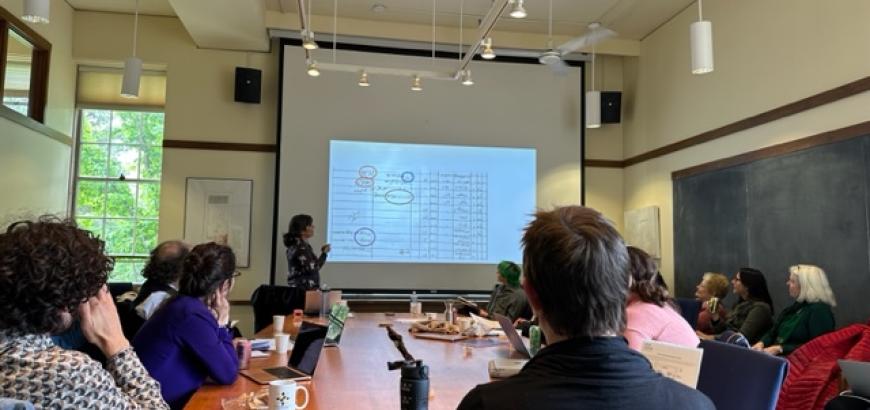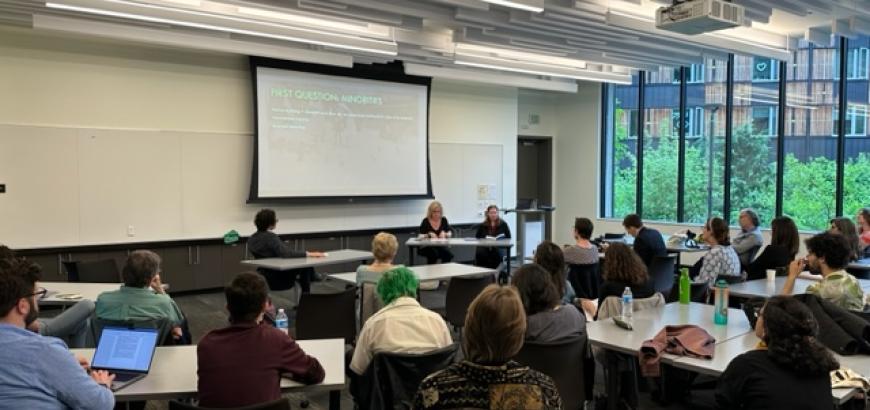From the start of the COVID-19 pandemic, there have been ongoing efforts to rethink the traditional conference model. For many, the long-held convention of gathering en masse felt increasingly unsustainable, not to mention unhealthy. Yet, virtual conferencing lacks the collegial atmosphere, networking, and dinner-time bonding that make conferences so valuable to many academics. This spring, a group of professors from History and Middle Eastern Languages also affiliated with the for Jewish Studies—Devin Naar, Liora Halperin, and Canan Bolel—took on the challenge of developing a new conference format that would promote productive and synergistic conversation without the bloated costs and front-facing presentations typical of traditional conferences.
Focusing on a theme of Jews at the end of the Ottoman Empire, conference planners personally invited a small group of professors and graduate students to participate. Papers were circulated in advance, and, rather than relying on the traditional format of a 20-30 minute research presentation followed by Q&A, each presenter was given only ten minutes to speak and were asked to focus on presenting a single historical source in their work. These presentations were then followed by an hour of group discussion in which all of the conference participants added their own perspectives and ideas. This roundtable format, combined with the small gathering and shared meals, created a positive and generative intellectual environment rarely seen at even the best of conferences.
Professor Halperin explained the reason for the format stating, “We were focused on making sure that participants wouldn't use their presentation time simply to review the main contents and arguments of the paper. We thought that asking individuals to focus on a single primary source would focus their thoughts, allow presenters to go deeper than their papers had in explaining or contextualizing the source, and let us work together to help writers further interpret or think about particularly vexing or intriguing documents.” Co-organizer Professor Naar added that, in addition to this format, they tried to break down traditional barriers in the academy, stating, "We wanted to bring together scholars from different specialties and put them in dialogue with each other, organizing a conference that would bring together Sephardic Studies, Jewish Studies, Israel Studies, Ottoman and Turkish studies. Bringing all these different fields together helped us think across time, space, and cultures and brought together scholars who might never have met otherwise."
Their two-day event, titled “Jews Amidst the Embers of the Ottoman Empire,” was highly regarded by attendees for its innovation and productivity, and many agreed that it set a benchmark for future academic gatherings. As an added benefit, the conference format helped break down hierarchies and connected graduate students to leading scholars in their field. “I didn’t feel like the kid brother trying to butt my way into the conversation, as often feels the case at big conferences,” explained UW graduate student Jake Beckert. He went on to add, “Instead, I was treated as an equal part of the intellectual community; my voice was heard and respected.”
Conference organizers are already brainstorming ways to build upon this momentum and hope to find another opportunity to plan a similar gathering. Admittedly this may take a while. “A conference like this doesn’t just happen overnight; it takes a lot of time and planning,” Professor Naar emphasized. In the meantime, the Stroum Center for Jewish Studies will publish an online collection of short essays by conference participants that contextualize their primary sources, highlight the stories they offer, and reflect on methodological possibilities and challenges in their work. UW graduate students Joana Bürger (History) and Sasha Yilmaz-Ward (NMES) will be curating the collection in collaboration with Ayin Press.
More information on the conference can be found here.

